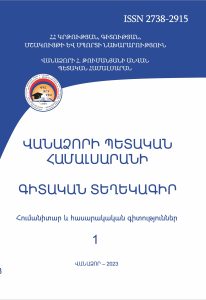Eternal Problems as a Factor in the Development of Philosophical Knowledge
Scientific Proceedings of Vanadzor State University Humanitarian and Social Sciences (ISSN 2738-2915)
2023 vol 1
Eternal Problems as a Factor in the Development of Philosophical Knowledge
Gnel Tigranyan
Summary
 Key words: eternal problems, philosophical knowledge, worldview, theory, unique and universal knowledge
Key words: eternal problems, philosophical knowledge, worldview, theory, unique and universal knowledge
The eternal philosophical questions that determine the nature of scientific thought and the meaning of artistic imagination appear in the minds of people in the pattern of new (actual) problems within the formation of sometimes mystical hypotheses, but more often – rigorous scientific theories. The following philosophical problems can be regarded as the most interesting: the problem of the beginning, the problem of the material and the ideal, the problem of soul and body, the problem of freedom and creativity of the individual, the problem of the meaning of life, the problem of truth. For each of them there is a list of solutions proposed by philosophers of a particular era. Scientific research in the field of natural and social sciences involves a corresponding process in which the presented problem is subjected to a hypothetical solution and its theoretical base is formed. In the field of philosophy, this mechanism does not work. Philosophy is not only a science, but also a worldview. Worldview problems do not have an unambiguous and final settlement. The problems here are eternal. Each historical epoch creates a compact system corresponding to the level of knowledge and worldview development of its time.
However, in the process of further development, the “reliable theory” faces a new problem, for the solution of which the study undergoes a new cycle. These transitional stages accumulate an undeniable system of knowledge; however, the main question always remains open and unresolved. Eternal problems feed science with new theoretical propositions and create new foundations and opportunities for its subsequent development. This is not only the logic of philosophy development, but also the logic of science development as a whole.
